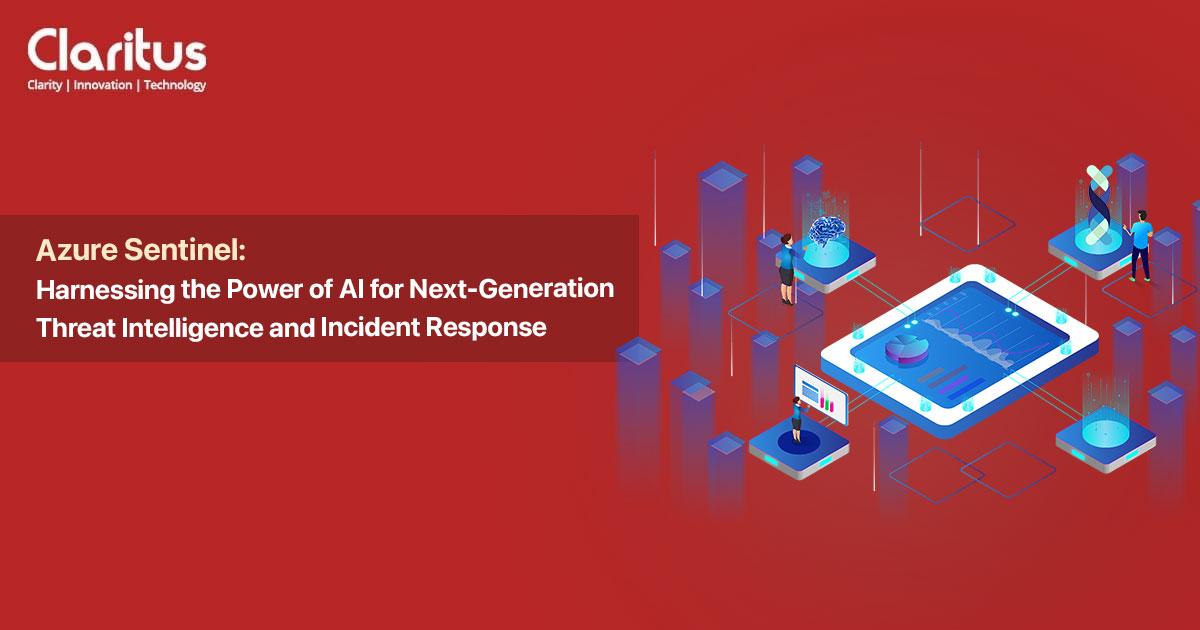Azure Sentinel: Harnessing the Power

How Azure Sentinel helps security teams to detect, investigate, and respond to advanced threats across hybrid and cloud environments
Cybersecurity is a constantly evolving challenge for organizations of all sizes and sectors. As the threat landscape becomes more complex and sophisticated, security teams need to leverage the latest technologies and tools to protect their assets and data. However, traditional security solutions often fall short of meeting the demands of modern security operations. They are siloed, fragmented, and generate a lot of noise and false positives. They also require a lot of manual effort and expertise to manage and maintain, which can lead to inefficiencies and gaps in coverage.
That’s why Microsoft developed Azure Sentinel, a cloud-native security information and event management (SIEM) and security orchestration, automation, and response (SOAR) solution that empowers security teams to proactively defend their organizations from cyber threats. Azure Sentinel is built on the Azure platform and leverages the power of artificial intelligence (AI) and machine learning (ML) to provide next-generation threat intelligence and incident response capabilities. Azure Sentinel helps security teams to:
- Collect and analyse data from a wide range of sources, including Microsoft products and services, third-party solutions, and on-premises and cloud environments.
- Detect and prioritize threats using advanced analytics, threat intelligence, and user and entity behaviour analytics (UEBA).
- Investigate and hunt for threats using interactive dashboards, visualizations, and notebooks.
- Respond and remediate incidents using automated playbooks, workflows, and actions.
- Optimize and scale security operations with a flexible and cost-effective pricing model .
In this blog post, we will explore how Azure Sentinel enables security teams to harness the power of AI for next-generation threat intelligence and incident response. We will also share some best practices and tips on how to get started with Azure Sentinel and make the most of its features and benefits.
How Azure Sentinel uses AI to enhance threat intelligence and incident response
Azure Sentinel is designed to help security teams overcome the challenges of traditional security solutions and improve their security posture and efficiency. Azure Sentinel uses AI and ML to augment human capabilities and automate tedious and repetitive tasks. Some of the ways that Azure Sentinel uses AI to enhance threat intelligence and incident response are:
AI-powered analytics: Azure Sentinel applies ML models and algorithms to the collected data to identify patterns, anomalies, and indicators of compromise (IOCs). Azure Sentinel also uses AI to correlate and fuse data from different sources and enrich it with contextual information. This helps security teams to reduce false positives, prioritize alerts, and focus on the most relevant and critical threats.
AI-powered threat intelligence: Azure Sentinel integrates with Microsoft Threat Intelligence Centre (MTIC) and other external threat intelligence providers to provide security teams with up-to-date and actionable insights on the latest threat actors, campaigns, tactics, techniques, and procedures (TTPs). Azure Sentinel also uses AI to generate custom threat intelligence based on the organization’s own data and environment. This helps security teams to anticipate and prevent attacks, as well as to respond faster and more effectively.
AI-powered investigation and hunting: Azure Sentinel provides security teams with interactive and intuitive tools to investigate and hunt for threats. Azure Sentinel uses AI to automate the creation of investigation graphs, which visualize the relationships and connections between entities and events involved in an incident. Azure Sentinel also uses AI to provide security teams with notebooks, which are pre-built or customizable scripts that can perform complex data analysis and manipulation. This helps security teams to gain deeper insights, uncover hidden threats, and streamline the investigation and hunting process.
AI-powered response and remediation: Azure Sentinel enables security teams to automate and orchestrate the response and remediation of incidents using playbooks, workflows, and actions. Azure Sentinel uses AI to trigger playbooks based on certain conditions or events, such as severity, category, or status of an alert. Azure Sentinel also uses AI to execute actions, such as sending notifications, creating tickets, blocking IPs, or isolating devices. This helps security teams to accelerate and optimize the response and remediation process, as well as to reduce human errors and risks.
How to get started with Azure Sentinel and make the most of its features and benefits
Azure Sentinel is a powerful and versatile solution that can help security teams to improve their threat intelligence and incident response capabilities. However, to get the most out of Azure Sentinel, security teams need to follow some best practices and tips, such as:
Define the scope and objectives of the security operations: Security teams should identify the key assets, data, and systems that they need to protect, as well as the main threats and risks that they face. Security teams should also define the goals and metrics that they want to achieve and measure with Azure Sentinel, such as detection rate, response time, or resolution rate.
Plan and implement the data collection and integration strategy: Security teams should determine the sources and types of data that they need to collect and analyse with Azure Sentinel, such as logs, events, alerts, or telemetry. Security teams should also ensure that the data is properly formatted, normalized, and enriched for Azure Sentinel to process and use. Security teams should leverage the built-in connectors and integrations that Azure Sentinel offers, as well as the custom connectors and APIs that Azure Sentinel supports.
Configure and customize the analytics and detection rules: Security teams should review and adjust the default analytics and detection rules that Azure Sentinel provides, as well as create their own custom rules based on their specific needs and scenarios. Security teams should also test and validate the rules to ensure that they are accurate and effective, and that they do not generate too many false positives or negatives.
Utilize and enhance the investigation and hunting tools: Security teams should familiarize themselves with the investigation and hunting tools that Azure Sentinel offers, such as the investigation graph, the notebooks, and the hunting queries. Security teams should also explore and modify the tools to suit their preferences and workflows, as well as to add new functionalities and features.
Design and deploy the response and remediation playbooks: Security teams should create and implement the playbooks that automate and orchestrate the response and remediation of incidents. Security teams should also define the triggers, conditions, and actions that the playbooks should execute, as well as the roles, responsibilities, and permissions that the playbooks should follow.
Monitor and improve the security operations performance: Security teams should continuously monitor and evaluate the performance and effectiveness of their security operations with Azure Sentinel. Security teams should also use the dashboards, reports, and metrics that Azure Sentinel provides to gain insights and feedback on their security posture and efficiency. Security teams should also identify and address any gaps, issues, or areas of improvement that they encounter with Azure Sentinel.
Azure Sentinel is a comprehensive and innovative solution that helps security teams to harness the power of AI for next-generation threat intelligence and incident response. Azure Sentinel enables security teams to collect and analyse data from diverse sources, detect and prioritize threats using advanced analytics, investigate and hunt for threats using interactive tools, and respond and remediate incidents using automated playbooks. Azure Sentinel also helps security teams to optimize and scale their security operations with a flexible and cost-effective pricing model. Azure Sentinel is a game-changer for security teams that want to enhance their security capabilities and efficiency in the cloud era.









